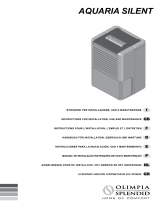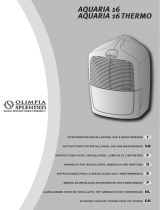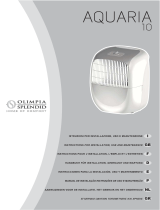
THE APPLIANCE IS SEALED AND CONTAINS
FLUORINATED GREENHOUSE GASES
GOVERNED BY THE KYOTO PROTOCOL. THE
“GWP” IS SET OUT IN THE “TECHNICAL DATA
TABLE”.
IMPORTANT: BEFORE ANY MAINTENANCE,
CLEANING, REPAIR OR OTHER, ALWAYS
DISCONNECT THE PLUG FROM THE
POWER MAINS. BEFORE RESTARTING THE
DEHUMIDIFIER, ENSURE THE ELECTRICAL
PARTS ARE NOT MOIST AND/OR WET.
►►1. SAFETY WARNINGS
The dehumidier must always be connected to
power sockets tted with earthing connection.
Failure to comply with this rule - as for all
electrical appliances - is a source of danger, for the
consequences of which the manufacturer disclaims
all liability.
The appliance may be disassembled exclusively by
a skilled technician.
When the appliance is connected to a power socket
it must be kept in vertical position and must not be
subject to violent movements. Any water escaping
from the tank might come in contact with electrical
parts, with obvious hazardous consequences. It
is therefore indispensable to disconnect the plug
before moving the dehumidier and empty the tank
before lifting it.
In the event a water spillage should occur as a
consequence of sudden motions, the dehumidier
must remain still in vertical position for at least
eight hours before being switched on again.
This dehumidier sucks air in from the front and
expels it through the rear grille; therefore the front
panel, which holds the air lter, must be kept at a
distance of at least fteen centimeters from the
walls.
Furthermore, the appliance must not be operated in
narrow spaces which do not allow circulation of the
air owing out of the rear grille into the environment.
However, the side panels may be drawn close to
walls without creating any hindrance to regular
operation.
This dehumidier has been constructed in
compliance with the strictest safety regulations.
However, no sharp objects such as screwdrivers,
knitting irons or similar must be inserted in the grille
or in the opening that remains exposed in the front
panel when the lter is extracted: this is dangerous
for persons and may damage the appliance.
To clean it outside you may use a moistened
cloth after disconnecting the power plug from the
electricity mains. Do not cover the front grille with
linen or other objects, the alliance gets damaged
and may cause danger.
Regularly clean the lter: cleaning must be
performed on average every month; in the event of
use in very dusty environments cleaning must be
more frequent. See the relevant chapter for cleaning
methods. When the lter is dirty the expelled air is
warmer than usual, damaging the appliance and
affecting performance.
►►2. DESCRIPTION OF THE DEHUMIDIFIER
All portable dehumidiers use the cooling cycle with
compressor. The appliances are described below.
►►3. ASSEMBLY OF THE DEHUMIDIFIER
This appliance is equipped with a handle. This component
is contained within the packaging of the dehumidier.
To install the handle follow the below steps (Fig. 1-2):
►3.1.Remove the screw that secure the cover to the
dehumidier (1);
►3.2.Rotate the cover (2);
►3.3.Remove the four screws located on the appliance
side, two on the left side and two on the right side (3);
►3.4.Place the handle in the proper position (4);
►3.5.Install the four screws in their proper position, two
on the left side and two on the right side (5);
►3.6.Rotate the cover to bring it back to a vertical position
(6);
►3.7.Install the screw than secures the cover to the
dehumidier (7).
►►4. OPERATION
This dehumidier is a cooling cycle appliance whose
operation is based on the physical principle by which
when air comes into contact with a cold surface it wets it
releasing moisture in the form of drops of condensation or
ice, when the ambient temperature is not high.
In practice, a nned coil is maintained cold by a
refrigerating machine, and the air that goes through it
cools and dehumidies. After that, the air goes through a
heat exchanger and is heated, to nally ow back into the
room dehumidied and at a slightly higher temperature
than the initial one.
Reference to drawing (Fig. 3):
Air is extracted through the front of the dehumidier: it
goes through the lter (1), the fan (2), the cold exchanger
(evaporator) (3), the hot exchanger (condenser) (4) and
nally the dehumidied air ows out and is recirculated
into the room through the rear grille. The condensed water
is collected in the tank (5). A microswitch (6) stops the
appliance when water in the tank reaches a certain level.
The humidistat (7) allows the dehumidier to operate when
the humidity in the room is higher than the desired level.
An electronic board (8) controls defrosting and prevents
the compressor (9) from starting up too often, which is
detrimental, and delays it.
These machines are tted with a hot gas defrosting device,
they are therefore equipped with a solenoid valve for hot
gas bypass, a special electronic board and a defrosting
thermostat.
The operation of the defrosting system is exclusive to
our products: in practice a system with a thermostat and
electronic control, it uses the hot gas bypass only for the
time strictly necessary. This extends the dehumidier’s life
and reduces the hot gas operation stage.
►►5. CONTROL PANEL
The control panel (Fig. 4) is located at the rear of the
dehumidier and includes:
►5.1.HUMIDISTAT (1): The humidistat carries a scale
from 1 to 5. Setting the humidistat at the minimum value
(1) means the dehumidier operates until 80% relative
humidity is achieved in the room. Setting the humidistat
at the maximum value (5) means the dehumidier
operates until 20% relative humidity is achieved in the
room. In the “CONT” position the dehumidier works
all the time regardless of the relative humidity reading.
en
it
de
es
fr
nl
pt
da
no
sv
pl
ru
cs
hu
sl
tr
hr
lt
lv
et
ro
sk
bg
uk
bs
el
zh









